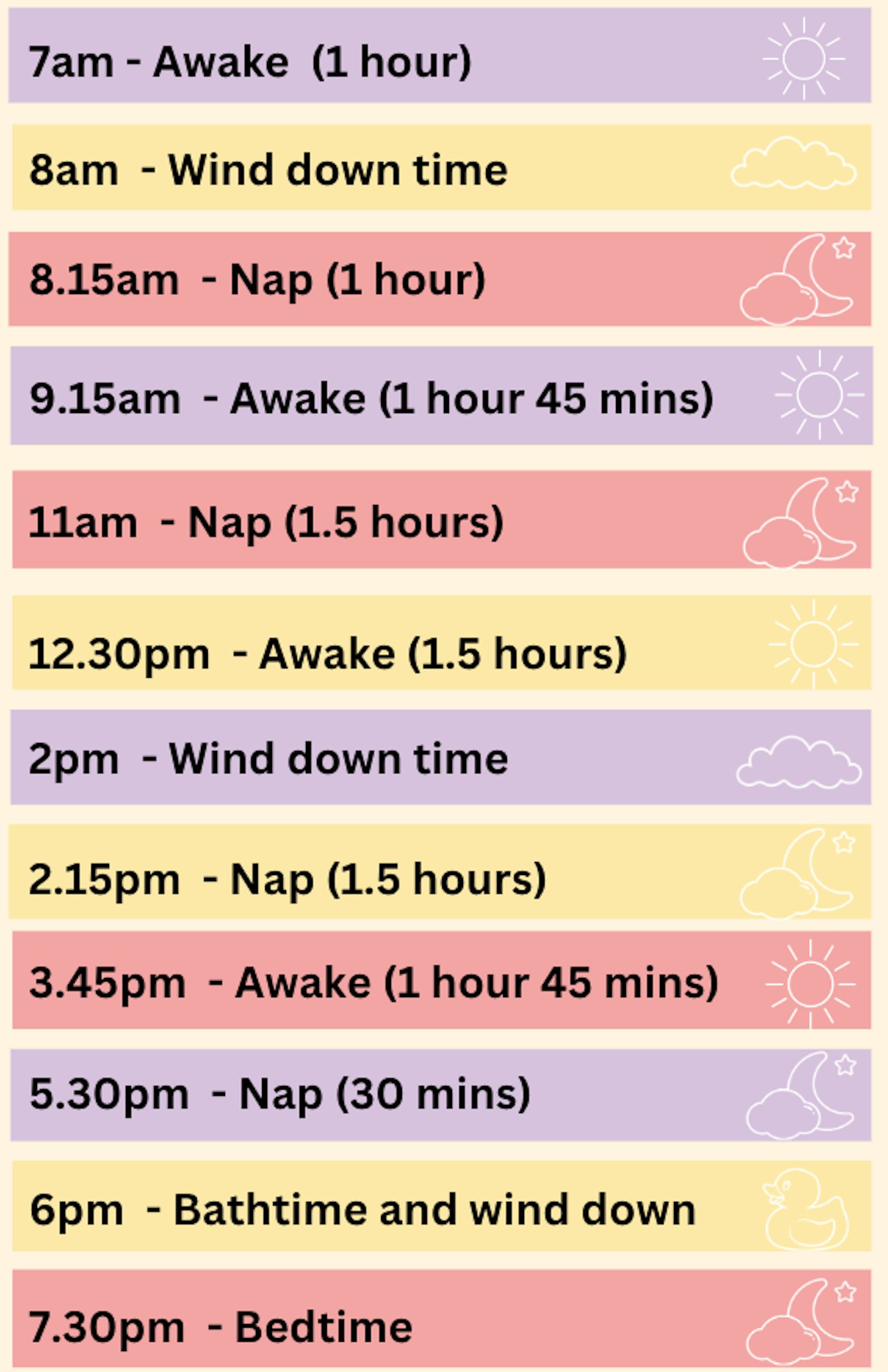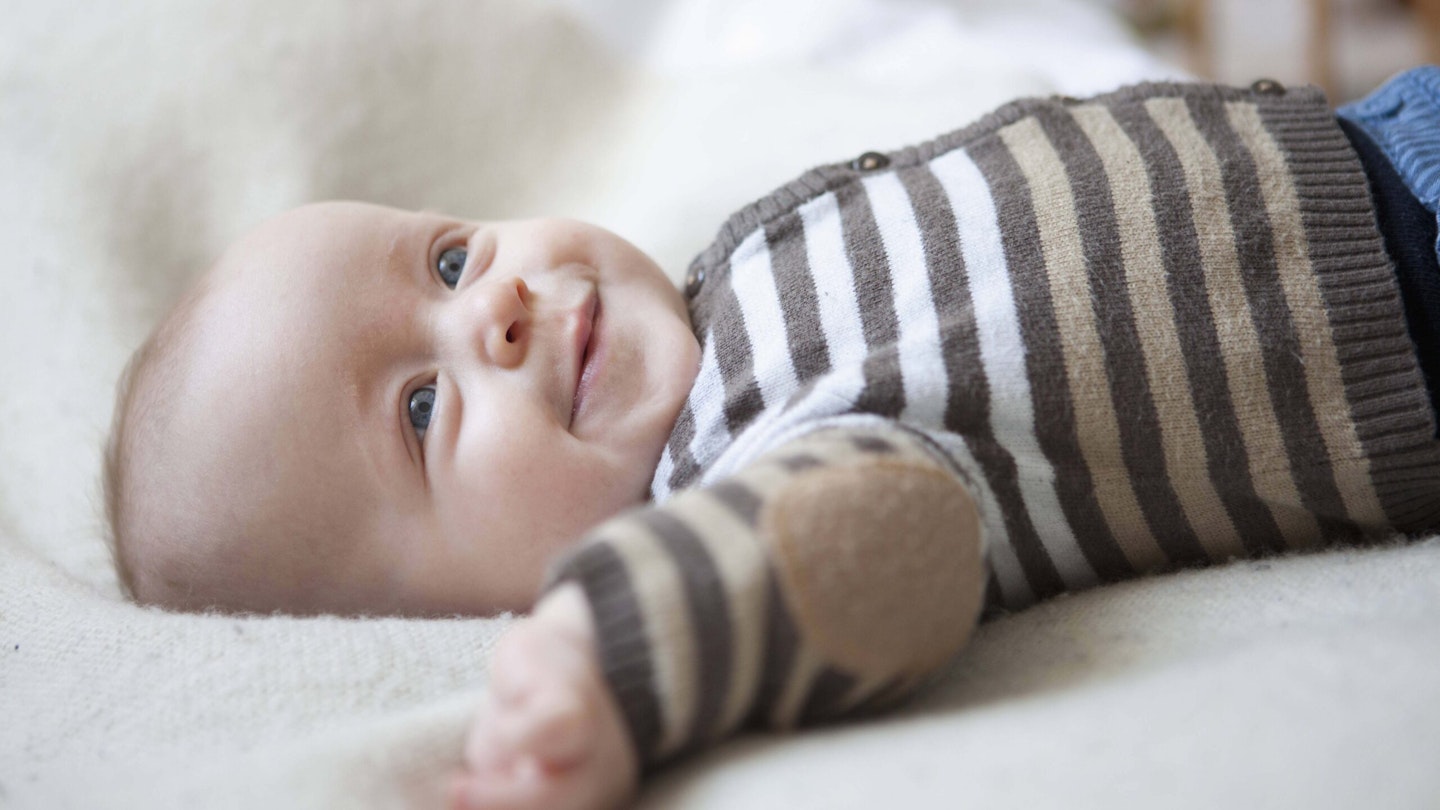Your baby is entering the 5-month milestone, that sleepy little newborn has disappeared, and your little bundle of joy is developing and growing every day. Babies this age are typically moving away from shorter but more frequent naps and (hopefully!) fewer night wakings. As your baby starts to mature, a more regular sleep pattern will naturally start to form. However, as ever in parenting, you’ll need to be flexible as things such as illness, growth spurts, and developmental regression can often throw a spanner in the works. Despite this, five months is a great age to begin a sleep schedule, to ensure your baby is getting the right amount of rest and active time that they need throughout the day.
I’m Jo Smith, founder of Jo So Sleepy a trained sleep expert and mother of three and I've developed this sample sleep schedule for you to follow. You may want to tweak the timings to better suit you, but it gives you a clear idea of exactly how many naps your baby should have, for how long and how long they should be awake in between these times.

Work out a sleep schedule
Five months is the perfect age to start a scheduled sleeping timetable, as some babies will start sleeping for longer stretches at this age. This is a sample sleep schedule I’ve developed. Every baby is different, so you may want to change the timings or feeding times to suit you, but it gives you a good idea of when and how long your 5-month-old baby should be sleeping across 24 hours.
5-month baby sleep schedule

5-month-old sleep and feeding schedule
7.00am- Awake and feed (awake 1 hour)
8.00am - Wind down time
8.15am - Nap 1 (1 hour)
9.15am - Awake ( 1 hour 45 mins)
11.00am - Nap (1.5 hours)
12.30am - Awake and feed (1.5 hours)
2pm - Wind down time and top up feed
2.15pm - Nap (1.5 hours)
3.45pm - Awake and feed (1 hour 45 mins)
5.30pm - Nap (30 mins) This is a cat nap to ensure babies aren't too tired at bedtime
but have enough sleep pressure for bedtime and overnight.
6.00pm - Feed
6.30pm – Bath and wind down
7pm- feed
7.30pm Bedtime
How much sleep do 5-month-old babies need?
In total, 5-month-old babies need around 14.5 hours of sleep over a 24-hour period.
How many hours a day should 5-month-old babies nap for?
Naps should total around 4 to 5 hours a day
What are the wake windows for 5-month-old babies?
Wake windows for babies aged 3-6 months are between 1.5 and 2.5 hours.
Sleep needs may vary and remember this is just a guide, it's always best to go with you baby’s mood and energy.

What time should a 5-month-old baby go to bed?
I recommend that a suitable bedtime for a 5-month old baby is from 7pm-8.30pm. However, this will depend on a number of factors. You will need to consider what time your baby wakes in the morning, how many naps they've had and how many hours of awake time they need before bed. In general, 5-month-old babies need 1.5 - 2.5 hours of wakefulness between their last nap and bedtime.
Is there a 5-month baby sleep regression?
It's quite common for parents to report a five-month sleep regression as their babies reach this milestone. Much like the four-month sleep regression, this will not doubt be due to all the developmental changes your baby is going through.
Sleep regressions are common phases where a baby who has been sleeping well suddenly starts waking more, begins to fuss more at nap and bedtimes and is finding it harder to drift off to sleep. If this is happening to you, don't worry, your baby is not really ‘regressing’; in fact, it's due to all the new skills and developments they're acquiring that are affecting their sleep patterns.
Stick to your sleep schedule and remember that when babies are mastering a new skill, like sitting up or rolling over, it can affect their sleep. Like all phases, it will pass, and your baby's sleep will improve again.
What's happening developmentally with a 5-month-old baby?
You should start noticing that at 5 months old, your baby is beginning to express himself through babbling, facial expressions like smiling and moving. Your baby may be trying to sit up or use their arms and hands to try and reach for things, normally your hair! They may also be rolling over on their own too. Remember that you should not swaddle a baby in bed past the age of 3 months due to safety reasons; they now need to have their hands and arms free at night.

When it comes to sleep, what are the differences between breastfed and bottle-fed babies?
1. Frequency of feeds
Breastfed babies tend to have more frequent night wakings. This is because breast milk is digested by babies faster than formula.
Bottle-fed babies can go longer between feeds at night because formula can be more filling and leads to longer periods of sleep.
2. Feeding to sleep
Breastfed babies are often nursed to sleep, unfortunately this can cause more night walking as babies associate feeding with sleep and can't self-soothe when they wake.
Bottle-fed babies can have the same problem if parents allow them to fall asleep while drinking milk. The same sleep association will occur and they will begin to rely on the soothing nature of milk in order to get back to sleep.
3. Satiation
Breastfed babies will feed more often but are more adept at self-regulating their hunger.
Bottle-fed babies are fed a specific amount of milk and unlike breastfeeding, parents can track how much milk is actually consumed. This helps to understand baby’s needs, as hunger can ruled out as a reason as to why your baby is waking in the night.
4. Single parent involvement
Nighttime feedings for breastfed babies usually involve the mother, who can find the sole responsibility of feeding their baby physically.
For bottle-fed babies, feeding can be shared between parents. This takes the pressure off one parent, encourages bonding with both mum and dad and allows for more flexible nighttime routines.

What common sleep mistakes do parents of 5-month-old babies make?
As parents, there are a number of things we may do without realising that can adversely affect our babies' sleep.
Here are the most common mistakes:
Irregular bedtimes: Not having a consistent bedtime routine can disrupt a child's sleep, making it harder for them to fall asleep, often causing overtiredness. Try and keep your baby's bedtime within the same 15-20 min range every night and make sure it's age- appropriate. A suitable bedtime for a 5-month old baby is from 7pm-8.30pm.
Missing naps: When babies miss naps, this causes overtiredness, meaning it is harder for them to wind down and get to sleep.
Too much screen time before bed: You might think this is too young to affect your baby, but if you have the TV on before bedtime and your baby is in their bouncer or on a mat, their eyes will be drawn to the screen. Exposure to screens has been proven to halt the production of melatonin, the hormone that regulates sleep.
Too much stimulation before bed: You might think you need to wear your baby out before bedtime, but engaging in active play or loud activities before bedtime can mean babies are too wired and find it difficult to wind down before bed.
Poor sleep associations: In the early days of a newborn, you may have rocked, fed or stroked your little one to sleep, but sadly, continuing to rely on these techniques means your baby will find it hard to self-soothe and need your help to get them back to sleep. This is creating bad habits that often become very hard to break as children get older.
Ineffective sleeping conditions: Not keeping your baby's slumber environment comfortable, dark, and quiet can lead to both poor quality and frequent wakings.
Not spotting signs of tiredness: The most common signs that 5-month old babies are tired are rubbing eyes, pulling ears, finger sucking, clinginess, crying, not wanting milk or increased activity. The danger of not putting your baby to sleep when they're tired is that you risk making them overtired, which means it'll be a lot harder for them to wind down and drift off to sleep.

Top sleeping tips for 5-month-old babies
1. Keep bedtime routines consistent
A familiar, relaxing and predictable bedtime routine helps to teach your baby that sleep is coming. Get them to wind down with activities like a warm bath, gentle massage, pyjamas, a lullaby, or reading them a book. Make sure that the process isn't too long, no longer than 45 minutes maximum.
2. Make a note of wake windows
Wake windows are the maximum amount of time your baby should be awake in between naps or before bed. Staying within hours (1.5-2.5 hours for a 5-month-old) helps prevent overtiredness, which can lead to difficulty settling down and more night wakings.
3. Encourage baby to fall asleep on his own
Encouraging your baby to self-soothe and drift off independently can make a big difference in their sleep habits. Once they've learned this skill, they are more likely to settle back down independently when they wake at night. If they do wake at night, then it's likely to only be when they're truly hungry.
Instead of feeding to sleep, put them into their cot when drowsy but awake and give them a few minutes to settle themselves to sleep.
4. Keep bedrooms dark
Did you know that a dark room can help your baby sleep longer? The dark encourages the release of melatonin, a sleep hormone that will help baby drift off and stay asleep. Try investing in some blackout curtains or shades as these can be particularly useful during the summer months when it's lighter in the evenings and in the morning.
5. Cap naps to protect bedtime
If your baby is napping for too long, wake them up. If you don't limit individual naps to be age-appropriate, your baby may not be sleepy enough at bedtime and start to mix up day and night. I recommend that a 5-month-old baby have naps ranging from 30 minutes to 1 hour and 45 minutes (based on having four naps a day). See sleep schedule above.
6. Don't ignore cries, but leave to settle
If your baby stirs or cries at night, don't rush in to feed or rock; wait a few moments to see if they resettle on their own. Sometimes, babies will fuss lightly before drifting back to sleep. If they continue to cry, check on them and offer gentle comfort to help them feel secure.
7. Address discomfort or hunger
Is your baby teething? Have they had enough milk? Make sure you give them something to soothe teething pain and monitor how much food they've had. Babies in this age range may still need one or two night feeds, so be mindful of hunger cues.
8. Adjust as needed during sleep regressions
At this age, babies go through developmental changes that can temporarily disrupt sleep and totally throw you off your sleep schedule. The best advice is to stick with your routines, understand that these phases are normal and often pass on their own within a few weeks.

9. Practice new skills in the daytime
Sleep regressions occur around the same time that your baby is approaching a big developmental milestone. One way to help offset this is to set aside lots of time during the day for your baby to try out their new skills. These could be rolling over, babbling, or even trying to crawl. This way, your baby will be less likely to practice these skills at bedtime.
Implementing these tips consistently can encourage better sleep patterns and help your baby develop a healthy relationship with sleep as they grow.
Founder of Jo So Sleepy, Jo Smith, is a certified sleep coach and a proud mum of three wonderful girls. Her journey into sleep coaching began from her own experience as a sleep-deprived mother, navigating the challenges of sleepless nights and the quest for restful sleep. After using a sleep coach herself, which she found to be life-changing, she recognised the profound impact that proper sleep support can have on families.
Understanding firsthand how exhausting it can be to care for little ones while juggling the demands of motherhood, she knows just how crucial sleep is for both parents and children. Driven by her passion for helping families, Jo changed her career to guide parents through the sleep struggles that often arise with newborns, toddlers and children.
